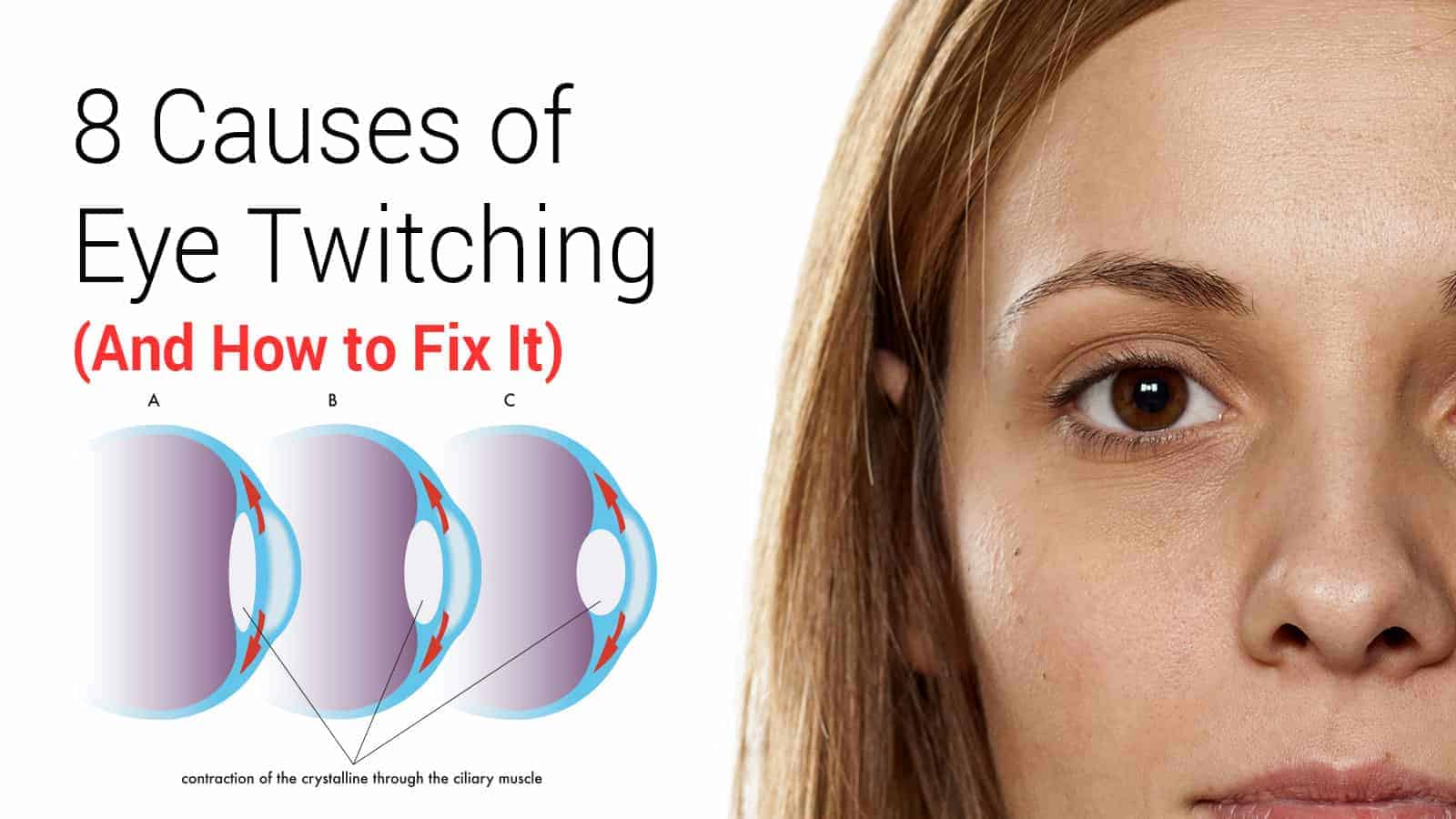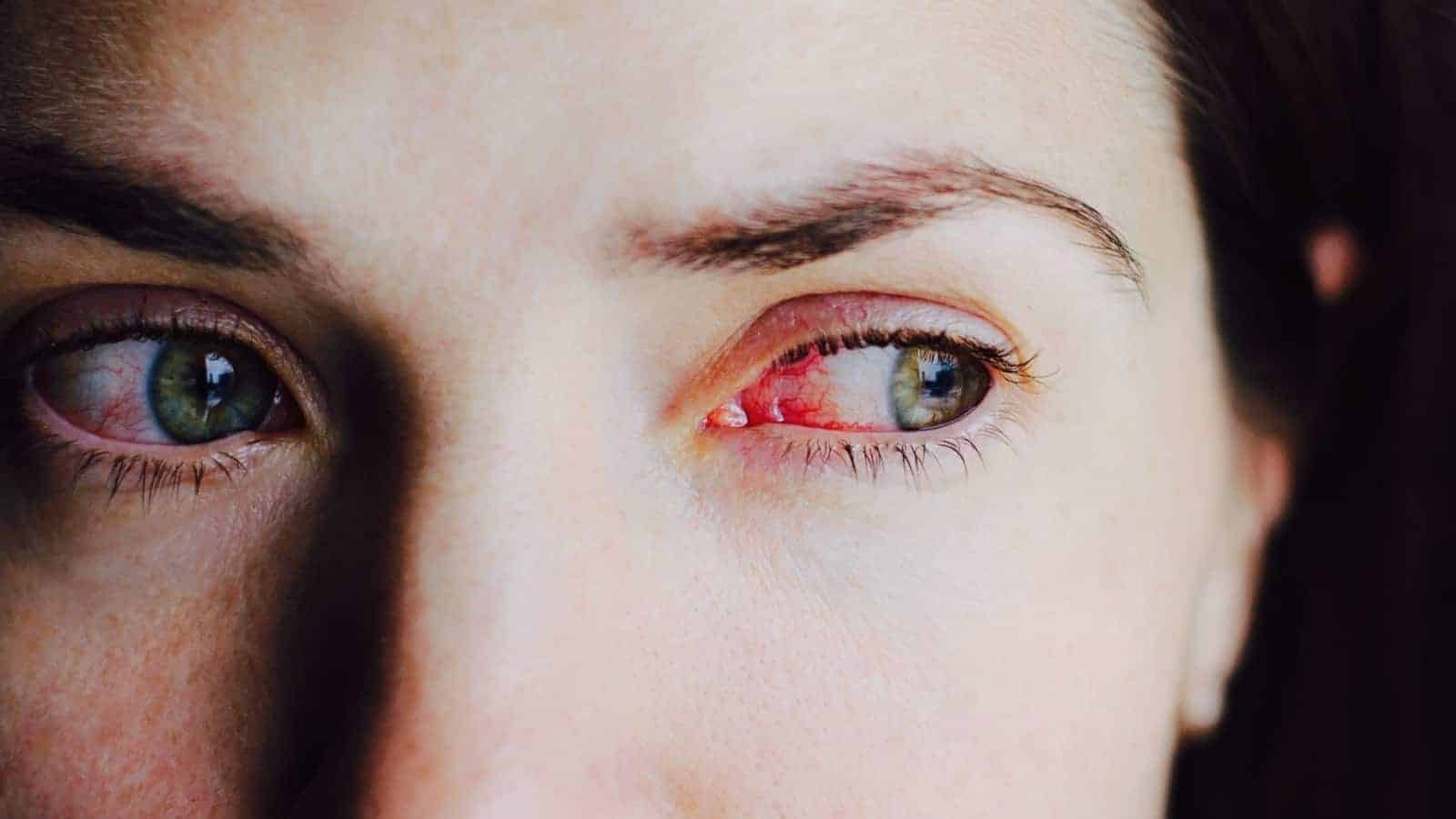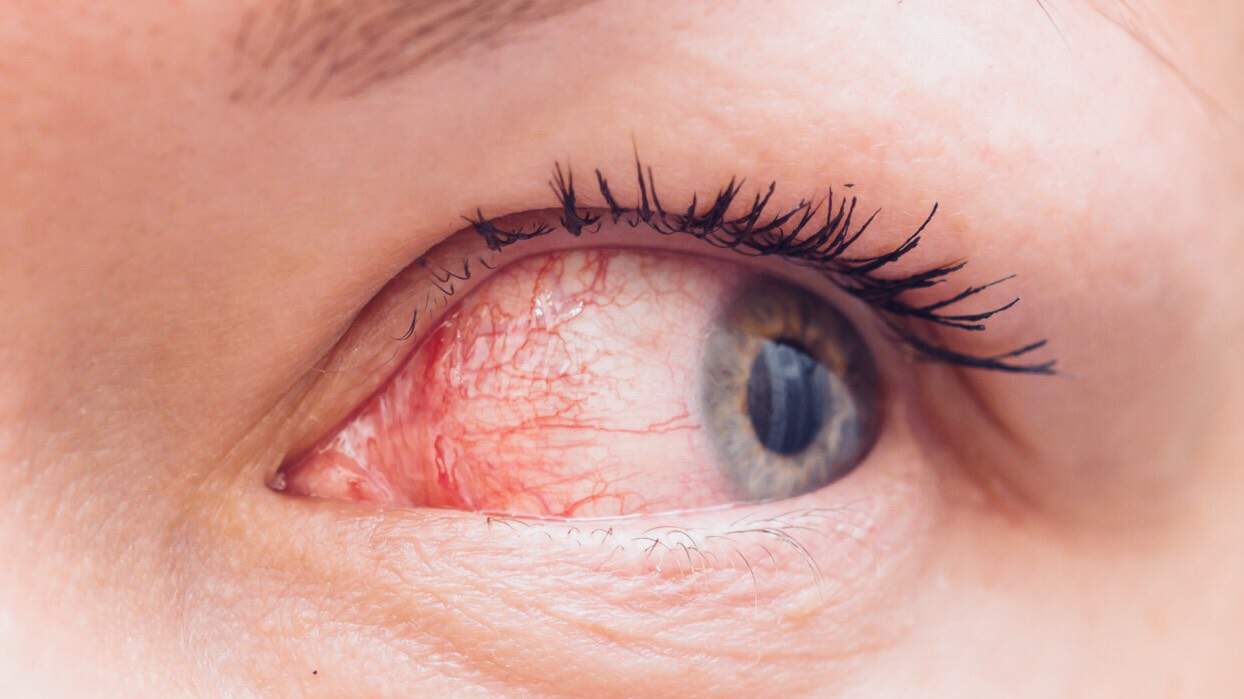Twitching eye muscles can be a persistent annoyance throughout the day. It can make it even harder to concentrate and also interfere with your vision. Eye twitching refers to uncontrollable eyelid spasms and has a variety of causes.
Eye spasms usually only last for a few minutes. However, eye twitching can persist up to days at a time in more severe cases. Fixing your eye twitch depends on the cause of the twitching. So here are the eight most common causes of eye twitching and how best to fix it.
8 Common Causes of Eye Twitching (and the fixes!)
1 – Stress
Stress is undoubtedly the most common cause of eye twitching. The extra adrenaline caused by the fight or flight response of being under prolonged stress primes your muscles to deal with a situation your body perceives as dangerous. This excess adrenaline can also prime the muscles in your eyelids, and with too much built up adrenaline will cause your eyelid muscles to spasm.
The best way to alleviate the eyelid spasm caused by stress is to find ways to destress and take some downtime during your day. Doing yoga exercises or socializing with friends and family can be a great way to help reduce stress and cure your eye twitching.
2 – Caffeine
Having too much caffeine can trigger eyelid spasms the same way that stress does. Caffeine acts as a stimulant to help jolt your body into action, providing a rush of adrenaline and other chemicals to keep you going. Too much caffeine can overstimulate the eye muscles, causing uncontrollable spasms and twitching.
The best way to alleviate spasming caused by caffeine is to cut back on it. Don’t drink as much coffee as you usually do and avoid sugary energy drinks or energy boosters. You can replace those high caffeine drinks with water and natural energy boosters like whole grains. That way, you’ll keep your body fueled and ready to go without overstimulating yourself with caffeine and then burning out, giving you more of a slow burn of energy throughout the day instead of a massive short term burst.
3 – Fatigue
Eye twitching can be caused by not having enough energy as well. This scenario can lead to your body struggling to keep your eyes open. Or, you might not have enough energy to keep your eyelid muscles in the open position.
Making sure you are getting enough rest is essential, but also having a consistent sleep schedule. Reducing muscle twitching isn’t the only reason you should try to get more sleep, though. Getting adequate rest can provide many overall health benefits as well.
4 – Eye Strain
Eye strain, specifically from screens and digital devices, can lead to muscle spasms and twitching of your eyelids. The digital light can overstimulate the brain and eyes, leading to a dull ache as well as your eyelids spasming to help cut down on the harsh light penetrating the eyes.
One of the best ways to cut back on this source of eye strain is to follow the 20/20/20 rule whenever you’re using a screen or phone for an extended time.
For every 20 minutes you spend looking at a screen, take about 20 seconds to focus on an object at a distance away (about 20 feet if possible). This habit helps give your eyes a break and cuts down on eye strain caused by staring at a screen for extended periods.
5 – Drinking Alcohol
Alcohol can cause a lot of muscle problems, including muscle weakness as well as spasms. These spasms can also include the muscles in your eyelids. The chemicals in alcohol can interfere with the neurological signals sent from the brain to the motor nerves in your muscles, causing the spasming and twitching.
If you are suffering from muscle spasms due to alcohol, cut back on how much you drink each day, limiting yourself one drink per night, or simply take a break from alcohol altogether.
6 – Dry Eyes
Dry eyes can be another frequent cause of twitching eyelid muscles, especially in people who are over 50. Other factors can make dry eyes more common, such as excessive use of computers, certain medications, the use of contacts, and the consumption of caffeine and alcohol.
Twitching from dry eyes is your body’s reaction to trying to rehydrate your eyes, as your eyelids help distribute moisture from your tear ducts across the surface of your eyes. You’ll almost feel a gritty texture under your eyelid as if you had something stuck in your eye if you are suffering from dry eyes.
If your twitching is, in fact, from dry eyes, you may want to consult your eye doctor. After an examination, your doctor will be able to either advise lifestyle changes to help reduce the frequency of your dry eyes or prescribe moisturizing drops to help hydrate your eyes.
7 – Nutritional Problems
Not getting enough essential vitamins and minerals such as magnesium can lead to eyelid spasms and other muscular problems. Try to stick to a reasonably balanced diet and eat more whole foods like fresh fruits and vegetables, whole grains, and avoid processed foods. Not only will this help with the twitching, but it will lead to an overall more healthy lifestyle too.
8 – Allergies
People who suffer from allergies can end up with a variety of symptoms, which ultimately lead to eyelid twitching. Allergens can irritate the eye, leading to dryness, swelling, and watery eyes.
Additionally, our first reaction is to usually rub at our eyes, causing histamines to be released into the eyelid tissues and resulting in spasming of the muscles.
Sometimes over the counter medicine can help reduce allergy symptoms, but these eye drops and allergy medications can also lead to dry eyes (see #6). Your eye doctor may be able to make recommendations of specific drugs or eye drops to use to help alleviate your allergy symptoms.
Most importantly, if you feel your eyes start to itch from allergies, don’t rub them. Instead, run them under water or apply a damp washcloth over your eyes to help hydrate them. This action will also clear any allergens that may have come in contact with your eyes.
When Eye Twitching Might Indicate a Looming Concern
While many of the common causes of eye spasms are relatively mundane and can resolve themselves on their own, sometimes eye twitching can be a sign of a more serious condition, especially if it lingers for days at a time.
Specific types of eye spasms can also be a sign of a more severe condition. If you have a sudden change in appearance and movement over half of your face, or if your eyelids spasm to the point where they clamp shut and can’t be opened, it may be a sign of a severe neurological condition such as blepharospasm or hemifacial spasm.
These kinds of spasms can also be a sign of other neurological disorders and are almost always accompanied by other symptoms associated with these disorders. Neurological conditions that have eye spasms as a symptom include:
- Bell’s Palsy
- Cervical Dystonia
- Dystonia
- Multiple Sclerosis
- Oromandibular dystonia and facial dystonia
- Parkinson’s Disease
- Tourette’s Syndrome
You shouldn’t rush to see an eye doctor over every little eye twitch. If it persists for more than a day, though, you should see a doctor. You should also seek help if it’s accompanied by other symptoms like a loss of facial motor control, being unable to open your eyes, or numbness and tingling sensations.
If you sense something is seriously wrong or if the twitching feels like any of the common causes above is not causing it, seek medical attention.
Final Thoughts on Managing Eye Twitching
Eye twitching can be extremely annoying and distracting. But luckily, its causes are relatively mundane, and the twitching usually resolves itself after a few minutes. Depending on what is causing your eye to twitch, you can help alleviate the spasms faster. You can also reduce the frequency of the contractions by counteracting the causes.
These actions include the following:
- Having less caffeine if you are overstimulating your nervous system with coffee and energy drinks.
- Try new stress relief tactics if you are under a lot of pressure and constant stress.
- Taking breaks from using screens or devices which could be causing eye fatigue, especially if you need to use these devices most of your day for work.
- Consult your eye doctor for eye drops or anti-allergen medications to help with dry eyes and allergies.
Lastly, if you suffer severe symptoms or your eye twitching is accompanied by other symptoms like numbness, which leads you to believe something might be seriously wrong, contact your doctor immediately or go for emergency medical services. In rare cases, the eyelid spasms can be a symptom of neurological problems. And those issues may cause other complications if not adequately treated.

















 Community
Community

